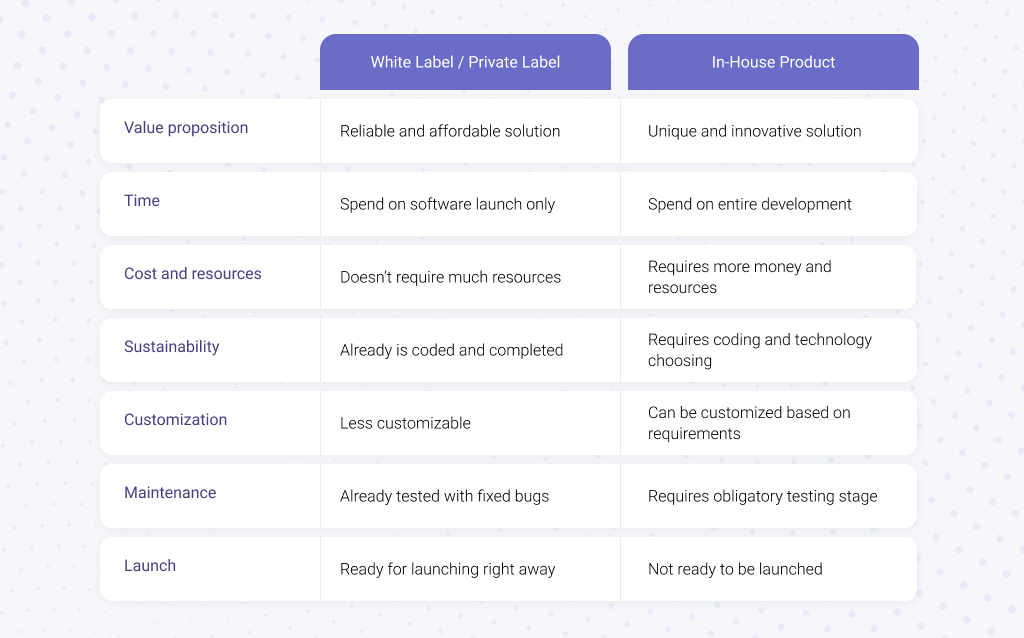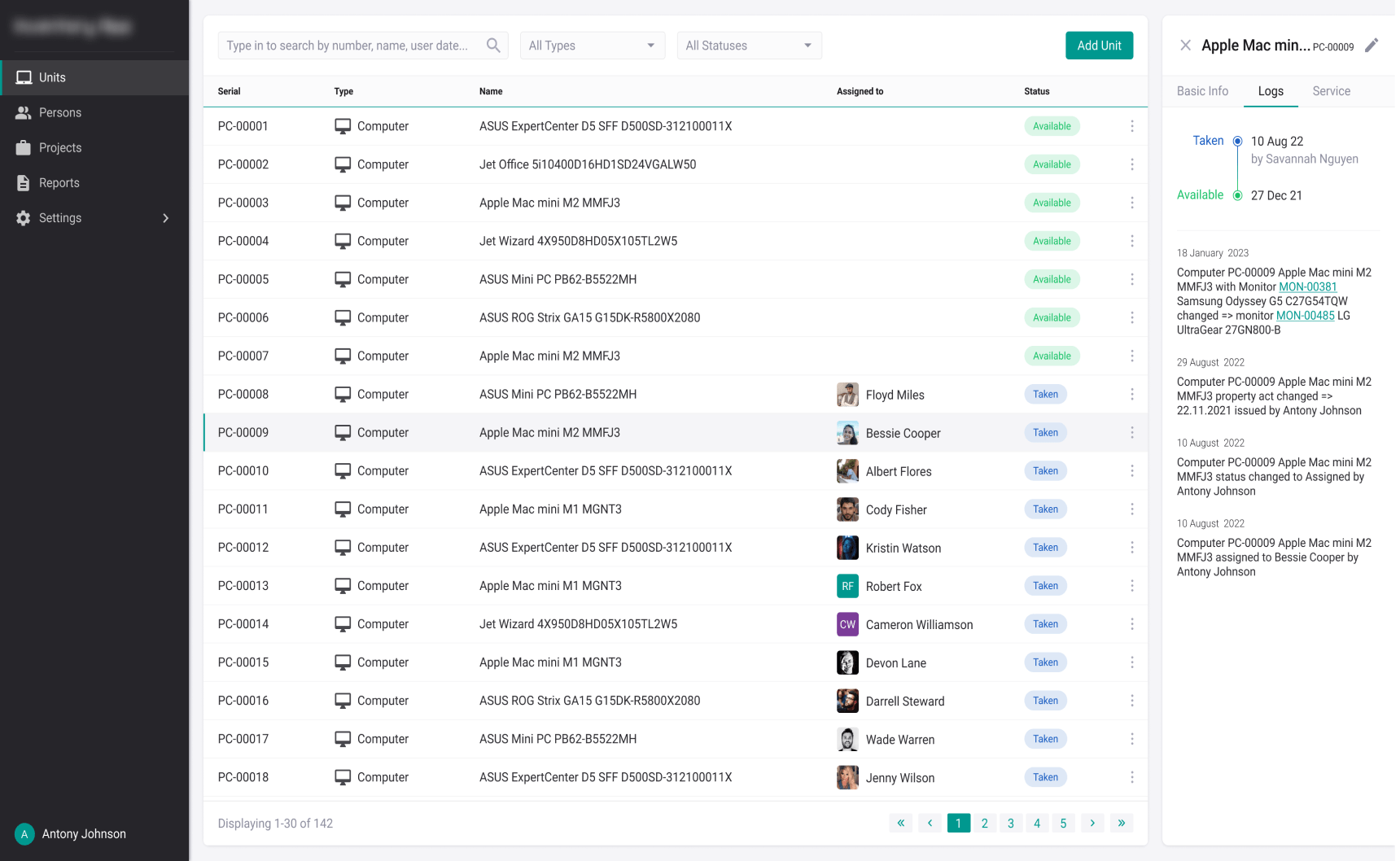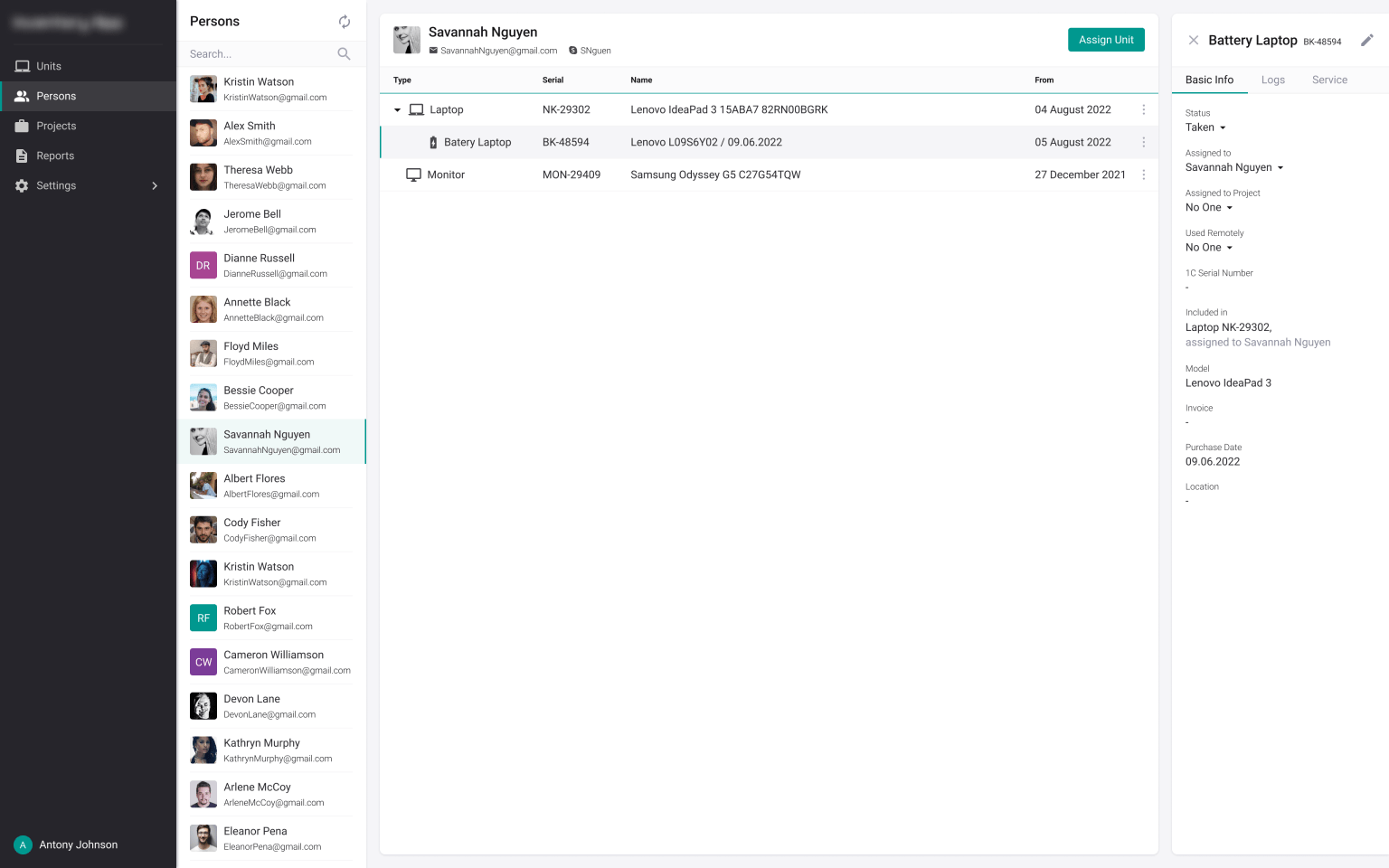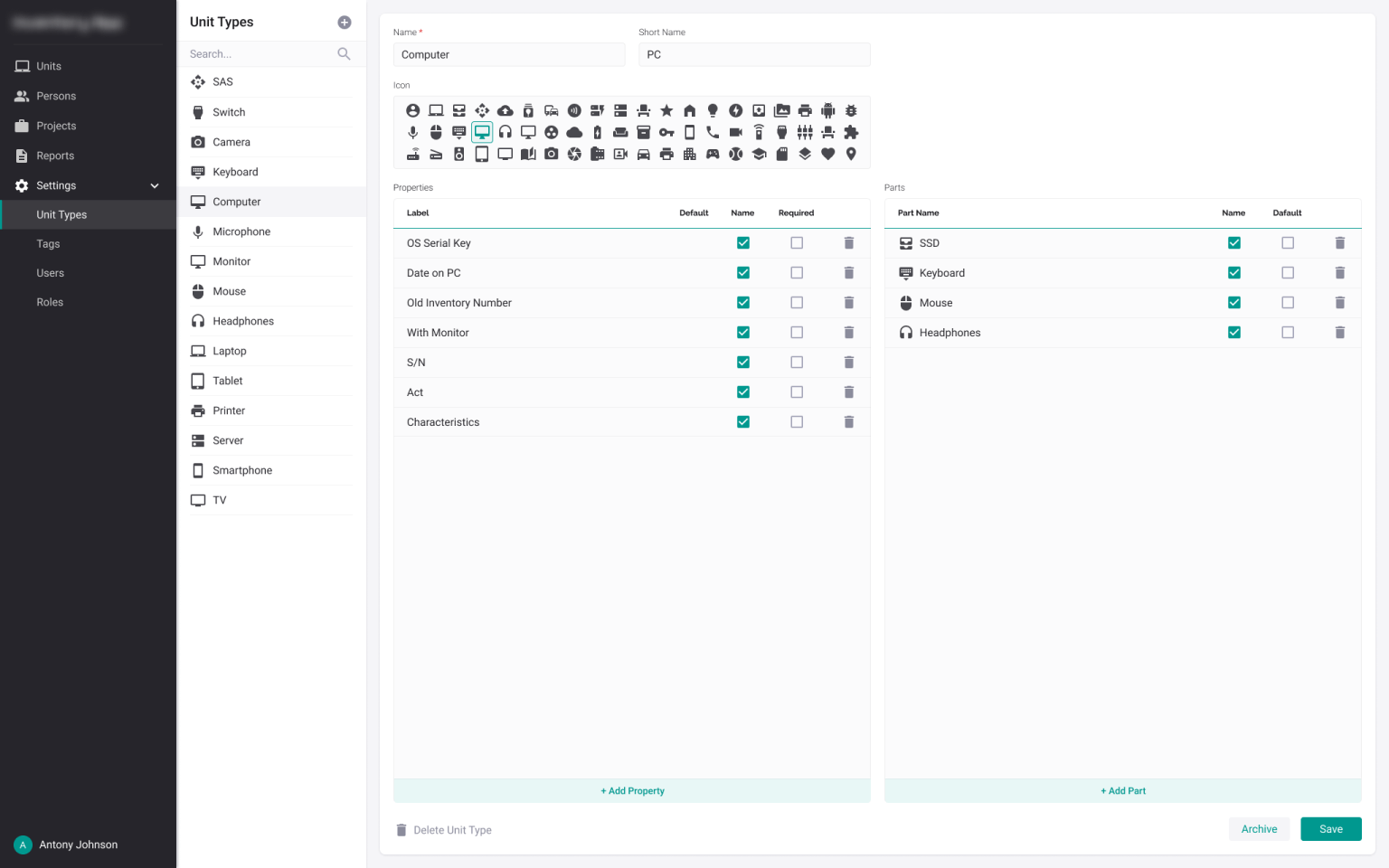
Running a business is a challenging task that demands business owners to go through trial and error and face many risks and uncertainties in the process. You may also face various dilemmas on your way to success. For example, you need software that will cover the needs of your employees or both employees and customers. Thus, you may run into the thoughts of whether to develop your own in-house product, buy a fully ready-made uncustomizable solution, or get a white label product to rebrand it according to your goals.
Choices, choices. It can be tough to make a decision. All options have their pros and cons, and the best one depends on your requirements, budget, and resources. Therefore, in this article, we will compare white label products, private label solutions, and in-house product development process to help you decide which path is right for you.
Quick Comparison of In-House Product vs. White Label Product vs. Private Label Product
In-house, white label, and private label software are three different ways of developing and distributing software products. To understand what each option means and gives to a company let’s determine specifics of these paths.
In-House Product Development
In-house software is a product developed by a company for internal use or for a specific client. The company has full control over the design, functionality, features, and quality of the solution and is able to customize it according to its needs and preferences. If you decide to build an application on your own, you will also be able to own its intellectual property rights and the source code. You just make it exclusively for your team and don’t need to share the system with anyone else.
However, the in-house software development process is usually more expensive and time-consuming. Custom software development is not an easy task to begin with, but dealing with such a project can be tiresome and will distract your team from other significant tasks. Imagine that you have to create a product from scratch using your own resources and expertise. Scandalous! Unless you have a huge team of highly professional experts who know how to develop software and have some free time – why not? But, if you have a business in any other sphere that doesn’t require developing software, you and your team don’t have to know how to do it. This is when you can leave this task to an outsourcing company and deal with your own problems instead.
White Label Product Development
Now, let’s look at the options that can make your life easier. Going for a product that is at least partly done changes your workflow and amount of the time and resources you are spending.
If talking about white label software first, this is a product made by a company to sell it to other companies who can launch it under their own brand names. In this case, you don’t have to invest in research and development, design, testing, or marketing. You just have to find a reliable supplier, choose the products you want to sell, and customize them with your branding and packaging. White label software is usually cheaper and faster to launch than in-house software. In simple words, this is like a base for a cake that you can decorate based on your own taste.

Source: White Label Online Exam System
Private Label Product Development
As for the private label software, it is similar to white label application development and is sometimes used interchangeably. However, these are two individual types of a product. The white label product is available for use by different companies and usually has less features in order to let you customize it as you wish. While the private label solution is sold to one company only and has more specific features a business wants to have. It means that a white label product can become a private label one. Private label software is usually more expensive and time-consuming to launch than white label software, but it also offers more control and exclusivity benefits.
Read Also In-house Vs. Outsourcing Software Development. Benefits and Pitfalls of Each Option
Making a Choice and Defining Development Aspects
There is no definitive answer to whether you should choose white label application, private label solution, or develop a system with the powers your in-house team possesses. It depends on your business goals, budget, resources, and market situation. To make your decision-making easier, let’s ask some of the burning questions.
- What makes your business stand out from others (value proposition)?
There are two options here. First, if you want to offer something completely unique and innovative, you might want to go for in-house product development. In case you want to offer something reliable and affordable, you might want to go for white or private label solutions.
- What is your market situation?
Do you know how competitive and saturated your market is? If the market you are in is highly competitive, in-house software development may be a better option. While for those who are in a less saturated market, buying a white label product will be a wiser choice.
- What is your budget?
It is vital to know how much money you are able to spend on the overall project and a product specifically. If your budget is limited, you might want to go for white label system. If you have a sufficient budget to spend on an in-house product, go for it.
- What are your resources (time, talent, technologies, etc.)?
You need to decide what and how much you have to create a product. If you have a lot of resources and all the required experts with the needed skills, you can easily go for the development of an application. If your resources are limited, maybe it will be better to choose a private or white label system.
- What are your preferences in the development process?
If you want to have the entire code ready, tested, and bug-free, choosing white label can provide you with this, because it has already undergone the testing stage and is ready for launching. Developing an application with your in-house team will require you to gather certain specialists in one place, choose relevant technologies and programming languages, and create code, which will take some time.
- How fast do you want to launch your solution?
If there is no time waiting and developing an application from scratch, a white label software can help. In case you have plenty of time and you don’t mind spending some of it on the whole development, you can opt for a custom software built from nothing.
There are many other questions that you may need to ask yourself to find out the best decision. To make it easier for you, we created a little checklist to see which option wins depending on each criterion.

However, you need to understand that it all depends on the goals that you set for your team.
Read Also How to Estimate Cost of Fixed Price Projects
Benefits of Using White Label Product (feat. XB Software White Label Warehouse Management System)
It is always easier to understand things when you see real-life examples, so let’s look at the White Label Warehouse and Inventory Management System we created to let all interested in this solution use it as their own. Therefore, we want to show how a white label application can be useful.
Our white label warehouse inventory management system (WMS / WIMS) is designed to help warehouse owners and managers optimize their inventory management processes, such as receiving, storing, picking, packing, shipping goods, and more. To begin with, we built this solution for our own business to help our employees better deal with the company’s inventory. We didn’t find the solution that could fit our requirements and criteria (inventory control, reporting, and other features we wanted). So, as a custom software development company we decided to develop our own WMS. We have been using it for many years and saw the potential it can bring to others. Therefore, we decided to share this solution with our customers and make it a white label product.

To understand how you can use our white label product, let’s see how we use this warehouse management system in our company. As you can see on the screenshot above, we can easily manage units in our inventory, assign to relevant employees and monitor all changes in real time. It gives a full understanding of the processes related to your inventory and/or warehouse.

Let’s say one employee needs some part of a unit, for example a laptop battery, while they already have been assigned with a monitor. Another employee needs the same monitor the first person has. Thus, an administrator will be able to check in a system who has the monitor, check the data it was assigned, and look for an alternative if the first person still needs it. With the help of such a system, the process is more automated and increases the speed of dealing with the tasks.

If needed, it is also possible to add other features to the system. For example, you can add detailed settings with dynamic tables to make the process even more streamlined. As you can see on the screenshot above, there are dynamic tables to let administrators set priorities and other settings according to the needs of a team. We decided to customize the system with the help of the Webix JavaScript UI library and its Dynamic tables to make the idea come true.
Read Also Using Dynamic Tables for Advanced Data Modeling and Analysis
Customization Options and Benefits
Depending on your needs, you can change our white label warehouse management system as you need. The sky is the limit, so you can basically do anything with the system. For example, you can integrate various third-party systems and services, such as barcode scanners, RFID readers, ERP systems, CRM systems, e-commerce platforms, shipping carriers, etc. The product can be customized and rebranded by the resellers, who can change the name, logo, color scheme, and features of the software according to their preferences and needs.
White label is a good option that offers various benefits to both businesses and their customers:
- Increased efficiency and accuracy of warehouse operations;
- Enhanced visibility and control over inventory levels and movements;
- Reduced operational costs and human errors;
- Improved customer satisfaction and retention;
- No need to spend resources on training and look for developers;
- Expanded market opportunities and revenue streams;
- Reduced risks and pressure for company and its clients;
- No need to spend time on searching for the best software solution.
Conclusions
White label products, private label solutions, and in-house product development are different ways of creating and selling products, and each business chooses what is the best for their exposure. Therefore, it is important to weigh the benefits and drawbacks of each option and define your goals carefully before making a decision. If you want to spend less and get more benefit, you can go for the white label option. But it all depends. So if you are not sure if white label is the right option for you, you can contact us and know more details about our white label WMS and how it can help you.

































